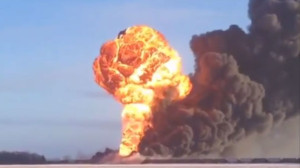The news of the fiery explosion of two trains in Panhandle, Texas broke as organizers in Houston were discussing how to reduce the high risks of accidents involving toxic trains in Houston. That day, June 28th, two trains collided, resulting in a fiery explosion, the presumed death of three workers and the hospitalization of another. The trains in Panhandle, TX, were fortunately not carrying crude. However, the collision and explosion reminded us of the importance of standing up for safety in rail transport during the Stop Oil Trains Week of Action, July 6th – 12th.
The Healthy Port Communities Coalition (HPCC) kicked off the week of action on July 6th with a press conference and a community meeting to discuss the risks that we Houstonians face as a result of rail traffic within our communities. This was especially poignant as less than a week earlier, on June 28th, two trains collided near Panhandle, TX, leaving 1 employee injured and 3 employees presumed dead. Fiery and fatal incidents over the past few years have increased concerns around rail, public safety, and chemical security, and we shared our concerns with media (“Exigen a autoridades frenar la contaminación por el transporte de combustible” and “Crude-by-Rail Plummeting In Texas But Critics Insist Risk Of Accidents Remains“) and with community members. From our discussion, community members wanted to find out more information about exactly what kind of chemicals are transported through their neighborhoods to better understand the risks. The HPCC is taking a stand against oil trains because we are concerned with hazardous, flammable materials coming into the Houston area. Toxic trains put Houstonians at risk through the possibility of explosion and by polluting the air with cancer-causing diesel and other toxic gases, through collisions, and by trapping folks behind stalled trains. One person reported being trapped behind a train for 90 minutes! (more…)




